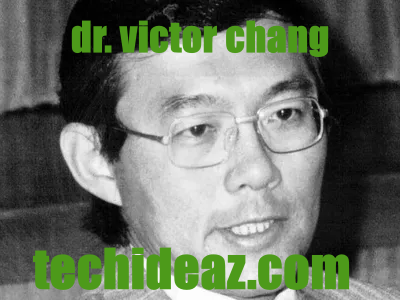Introduction
Dr. Victor Chang is one of the most respected names in the world of medicine, particularly in the field of cardiac surgery. His groundbreaking work has not only changed the landscape of heart surgery in Australia but also had a profound impact on medical practices worldwide. Born in China in 1936, Chang moved to Australia in the early 1950s, where his exceptional intellect and passion for medicine led him to become one of the world’s most renowned heart surgeons. He is remembered not only for his remarkable surgical skills but also for his dedication to medical research and his significant contributions to organ transplantation.
Dr. Chang’s pioneering work in heart transplantation and his development of innovative surgical techniques saved countless lives. He was instrumental in developing Australia’s first heart transplant program, and his contributions helped improve the outcomes of heart surgery across the globe. Tragically, his life was cut short when he was murdered in 1991, but his legacy lives on through the Victor Chang Cardiac Research Institute, which continues to advance heart health research.
This article will explore the life and legacy of Dr. Victor Chang, examining his early life, medical career, achievements, challenges, and the lasting impact of his work. Through his determination and brilliance, Dr. Chang helped shape the future of cardiac surgery and left an indelible mark on the medical community.
Early Life and Education
Dr. Victor Chang’s journey toward becoming a world-class heart surgeon began in a small village in China, where he was born on November 21, 1936. His family later moved to Hong Kong, where he spent much of his childhood. Despite the challenges of growing up in a tumultuous environment during the mid-20th century, Chang’s passion for learning and intellectual curiosity set him apart from an early age. In 1950, Dr. Chang and his family immigrated to Australia. This move opened up new opportunities for Chang, who quickly adapted to his new environment and excelled in his studies. He enrolled at the University of Sydney, where he earned his medical degree in 1958. During his time at university, Chang’s exceptional academic performance caught the attention of his professors, who encouraged him to pursue a career in surgery.
After completing his undergraduate education, Dr. Chang decided to further his medical training in London, where he worked at St. Thomas’ Hospital. It was during this period that Chang honed his surgical skills and developed an interest in cardiac surgery. His time in London exposed him to some of the best surgeons and medical minds in the world, fueling his desire to specialize in heart surgery.
The Rise to Prominence in Cardiac Surgery
After returning to Australia, Dr. Victor Chang continued to pursue his passion for cardiac surgery. In the early 1960s, he worked at Sydney’s Royal Prince Alfred Hospital, where he gained a reputation for his surgical prowess. It was here that Dr. Chang began to experiment with new techniques and approaches to heart surgery, particularly focusing on repairing damaged heart valves and improving surgical outcomes for patients with congenital heart defects.
In the 1970s, Dr. Chang’s interest shifted toward heart transplantation, a field that was still in its infancy. The first successful heart transplant had been performed in 1967 by Dr. Christiaan Barnard in South Africa, but the procedure was still considered highly experimental and fraught with risks. Dr. Chang, however, was determined to push the boundaries of medical science and was eager to establish a heart transplant program in Australia.
In 1984, Dr. Chang’s dream became a reality when he performed the first successful heart transplant at Sydney’s St. Vincent’s Hospital. The success of this procedure marked a turning point in Australia’s medical history and solidified Dr. Chang’s status as a leading figure in the world of cardiac surgery. Over the following years, he became a pioneer in heart transplantation, refining techniques and helping to improve post-surgical outcomes for transplant patients.
Dr. Chang’s Innovations and Achievements
One of Dr. Victor Chang’s most notable achievements was his development of a procedure to repair damaged heart valves. This innovation significantly reduced the need for heart valve replacement surgery, which had previously been a high-risk operation. By using advanced surgical techniques, Dr. Chang was able to repair damaged valves, allowing patients to retain their heart’s natural function and avoid the complications that often arise from valve replacement surgery.
Dr. Chang was also instrumental in advancing the field of organ transplantation. He worked tirelessly to improve the process of organ preservation and transportation, which are critical factors in the success of heart transplants. His research in this area contributed to the development of better methods for keeping donor organs viable for longer periods, thus increasing the chances of successful transplantation.
In addition to his clinical work, Dr. Chang was deeply committed to medical research. He established the Victor Chang Cardiac Research Institute in 1994, three years after his untimely death. The institute focuses on cutting-edge research related to heart disease, including the genetics of heart conditions and the development of new treatments for cardiovascular disorders. Dr. Chang’s vision for the institute was to create a legacy of excellence in cardiac research, and today, it continues to be a leading center for heart health research in Australia.
Challenges and Setbacks
Despite his success, Dr. Victor Chang faced significant challenges throughout his career. One of the biggest obstacles was the skepticism and resistance to heart transplantation in the early days of the procedure. Many in the medical community were wary of the risks and ethical implications of heart transplants, and some even questioned whether the procedure would ever become a mainstream practice.
Dr. Chang also faced personal and professional challenges, including the pressure of constantly working long hours and the emotional toll of dealing with critically ill patients. However, he remained undeterred by these difficulties, believing that the potential to save lives far outweighed the personal sacrifices. His perseverance and commitment to his patients were unwavering, and he gained the admiration of his colleagues and patients alike for his dedication.
The Tragic End and Lasting Legacy
Dr. Victor Chang’s life was tragically cut short on July 4, 1991, when he was murdered in a violent robbery outside his home in Sydney. His death shocked the medical community and the Australian public, as he was not only a beloved surgeon but also a symbol of hope and progress in the field of medicine. His passing left a void in the world of cardiac surgery, but his contributions to the field continue to inspire and guide future generations of doctors and researchers.
In the years following his death, the Victor Chang Cardiac Research Institute was established to honor his memory and continue his work. The institute has made significant strides in the areas of heart disease research and treatment, focusing on areas such as genetic research, stem cell therapy, and new surgical techniques. Dr. Chang’s pioneering spirit continues to live on through the groundbreaking research conducted at the institute, which is at the forefront of the global fight against heart disease.
Conclusion: Dr. Victor Chang’s Enduring Influence on Cardiac Surgery
Dr. Victor Chang’s life and work have had a profound impact on the field of cardiac surgery. His pioneering contributions to heart transplantation and his dedication to advancing medical research have saved countless lives and improved the quality of care for heart patients worldwide. Dr. Chang’s legacy is not just limited to his surgical achievements but also extends to the institutions and research initiatives that bear his name and continue to carry forward his vision.
His life serves as a reminder of the power of perseverance, passion, and dedication to improving the lives of others. Dr. Victor Chang’s story is one of triumph over adversity, and his groundbreaking work will continue to inspire future generations of doctors, surgeons, and researchers who seek to make a difference in the world of medicine.
FAQs
1. Who was Dr. Victor Chang?
Dr. Victor Chang was an internationally renowned heart surgeon from Australia, known for his pioneering work in heart transplantation and cardiac surgery. He is considered one of the leading figures in the development of modern cardiac surgery.
2. What is Dr. Chang’s most notable achievement?
Dr. Chang’s most notable achievement is the successful establishment of heart transplantation in Australia. He was also a pioneer in developing techniques for heart valve repair and improving organ preservation for transplantation.
3. How did Dr. Chang contribute to the field of organ transplantation?
Dr. Chang made significant contributions to organ transplantation by developing improved techniques for preserving and transporting donor organs. His research helped increase the success rate of heart transplants and other organ transplant procedures.
4. What is the Victor Chang Cardiac Research Institute?
The Victor Chang Cardiac Research Institute was established in honor of Dr. Chang after his untimely death. It focuses on advancing research in heart disease and improving treatments for cardiovascular conditions, continuing Dr. Chang’s legacy of excellence in heart health research.
5. What happened to Dr. Victor Chang?
Dr. Victor Chang was tragically murdered in 1991 during a robbery. His death was a shock to the medical community and the general public, but his legacy continues through his contributions to medical research and the Victor Chang Cardiac Research Institute.
This concludes the article on Dr. Victor Chang, his life, and his groundbreaking contributions to the field of heart surgery. His legacy continues to shape the future of medicine and cardiac research, inspiring new generations of healthcare professionals.
Also Read This: Dr. Victor Chang: The Legacy of a Pioneering Heart Surgeon and Medical Visionary










